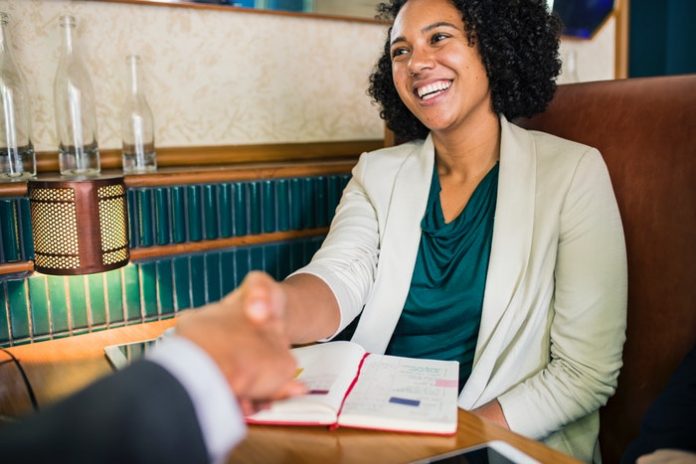Being able to build rapport with people is a valuable skill to possess. With the ability to engage with other people easily, understand their values and communicate effectively, you can enhance every area of your life. Whether you want to feel more confident in a social setting or connect with new colleagues at work, being able to build rapport is imperative.
What is rapport?
London Speech Workshop states that building rapport means cultivating relationships which are harmonious and friendly, and filled with mutual understanding. Often described as being ‘in sync’ with one another, when people have good rapport, it’s often evident in their communication skills.
Of course, rapport doesn’t mean being in agreement at all times, but it is indicative of a shared understanding and mutual respect. Indeed, building rapport is an effective way of gaining trust and admiration, even from people who are disagreeing with you.
Why does rapport matter?
When you have a good rapport with someone, you are able to connect and communicate with them more effectively. Applicable in all situations and environments, developing communication skills and building rapport can help to cultivate mutually satisfying relationships and establish common aims. While being able to build rapport is beneficial in all areas of life, it’s particularly important in a working environment. Sometimes referred to as creating a working alliance, building rapport with colleagues, peers and associates is important in any workplace.
In situations where nerves, anxieties and low self-esteem can harm your chances of securing a promotion or getting a new job, being able to build rapport can revolutionise your career. When it comes to impressing interviewers, pitching an idea to clients or lobbying for a promotion, having a good rapport with other people is integral to success.
Building rapport with active listening
Being empathetic, establishing shared understanding and communicating well are the cornerstones of rapport-building, and active listening can be an effective way to begin the process of creating a working alliance. Engaging in active listening affirms that you’re interested in what someone is saying, that you understand their viewpoint and that they are your sole focus at this time, all of which help to build rapport.
All too often, we listen to people halfheartedly, keeping one eye on a screen or tapping away on a phone as they speak to us. Distracted murmurs or preoccupied responses do little to show that person speaking that you’re hearing what they are saying. This type of communication is not only ineffective, it can actually be harmful to relationships. If someone is unable to get your attention, it won’t take long for them to feel frustrated, unappreciated and inconsequential, which certainly won’t facilitate rapport-building.
To practice active listening, you’ll need to ensure you can focus on the person who is speaking and actively engage with them. Non-verbal signals can be extremely effective when you’re listening to another individual, as they show that you’re taking on board what’s being said, without interrupting the person who is speaking.
Instead of remaining passive while you’re listening to someone, encourage them by maintaining eye contact, nodding your head and smiling at appropriate moments. Similarly, be aware of your posture when you’re communicating, and this will help to build rapport with the individual you’re conversing with. Leaning slightly forwards or tilting your head as you offer consistent eye contact reaffirms your interest and signifies that you are actively listening to what the individual is saying.
Can mirroring build rapport?
When you mirror someone’s behaviour, it can subconsciously signify shared behaviours and lead to good rapport. Matching the way someone else is sitting or mirroring their hand movements may sound somewhat simplistic, but the impact can be staggering. In addition, matching the cadence of their speech and breathing patterns can be another way of mirroring behaviour in order to establish good rapport.
Of course, when you mirror behaviour it’s important to do so subtly. Openly copying people’s movements is unlikely to be received well but taking a delicate approach to mirroring can be an effective way to enhance rapport.
Start by reading the person’s energy and determining whether they’re naturally loud and exuberant or whether they’re more reserved and sedate. Are they fast-paced and high octane or do they prefer a slow and steady approach to life? Identifying whether someone is high or low energy enables you to moderate your own behaviours. By ensuring you exhibit conduct which is in the same vicinity as theirs, you can successfully build rapport.
Are you showing an interest?
If you’re interested in what someone is saying, it will be obvious to the speaker and they will be encouraged to continue. As well as ensuring they feel comfortable now, this behaviour will confirm your interest and approachability for future communication too.
While non-verbal communication is an effective way of highlighting your interest in the speaker and what they are saying, verbal communication should play a role too. When you’re conversing with someone, be sure to ask relevant and open questions. This shows that you’ve heard what they’ve said, understood the information and retained it. Furthermore, seeking further information confirms your interest and your eagerness for the speaker to continue.
Of course, you will need to actively listen to and engage with their responses in order for this to be effective. When you’re able to disregard potential distractions, focus on the speaker and show that they have your undivided attention, you’ll be well on the way to establishing good rapport with them.
Can you learn to build rapport?
Absolutely! Some people may feel more comfortable engaging with other individuals, whilst small talk can be a painful chore for many people. Although the ability to build rapport does come naturally to some people, the vast majority of us require a little assistance. Undertaking communication courses and learning how to actively listen can be the most effective ways to establish these skills, particularly if you want to do so quickly. With dedicated support, you can learn the elements of building rapport and gain confidence in your newfound skills.
Find a Home-Based Business to Start-Up >>> Hundreds of Business Listings.

















































